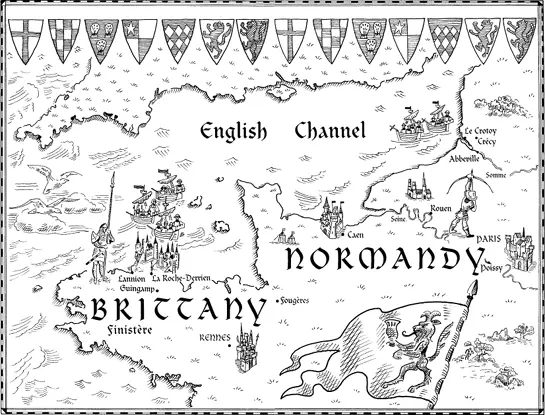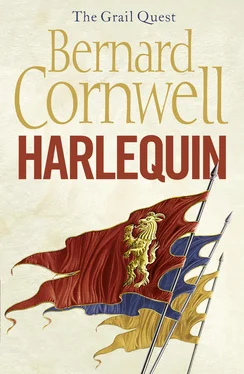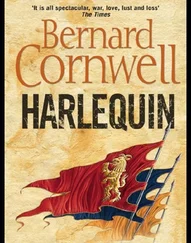BERNARD CORNWELL
Harlequin

Copyright CONTENTS Cover Title Page Copyright Dedication Epigraph Prologue Part One BRITTANY Chapter 1 Chapter 2 Chapter 3 Chapter 4 Chapter 5 Chapter 6 Part Two NORMANDY Chapter 7 Chapter 8 Chapter 9 Chapter 10 Part Three CRÉCY Chapter 11 Chapter 12 Chapter 13 Historical Note Keep Reading About the Author Also by Bernard Cornwell About the Publisher
Published by HarperCollins Publishers Ltd 1 London Bridge Street London SE1 9GF
www.harpercollins.co.uk
First published in Great Britain by HarperCollins Publishers 2000
Copyright © Bernard Cornwell 2000
Bernard Cornwell asserts the moral right to be identified as the author of this work
A catalogue record for this book is available from the British Library
This novel is entirely a work of fiction The names, characters and incidents portrayed in it are the work of the author’s imagination. Any resemblance to actual persons, living or dead, events or localities is entirely coincidental.
All rights reserved under International and Pan-American Copyright Conventions. By payment of the required fees, you have been granted the non-exclusive, non-transferable right to access and read the text of this e-book on-screen. No part of this text may be reproduced, transmitted, down-loaded, decompiled, reverse engineered, or stored in or introduced into any information storage and retrieval system, in any form or by any means, whether electronic or mechanical, now known or hereinafter invented, without the express written permission of HarperCollins e-books.
EPub Edition © 2009 ISBN: 9780007338788
Version: 2018-04-20
HARLEQUIN
is for
Richard and Julie Rutherford-Moore
‘…many deadly battles have been fought, people slaughtered, churches robbed, souls destroyed, young women and virgins deflowered, respectable wives and widows dishonoured; towns, manors and buildings burned, and robberies, cruelties and ambushes committed on the highways. Justice has failed because of these things. The Christian faith has withered and commerce has perished and so many other wickednesses and horrid things have followed from these wars that they cannot be spoken, numbered or written down.’
JEAN II, KING OF FRANCE, 1360
Harlequin, probably derived from the Old French hellequin: a troop of the devil’s horsemen.
Cover
Title Page BERNARD CORNWELL Harlequin
Copyright
Dedication
Epigraph
Prologue
Part One BRITTANY
Chapter 1
Chapter 2
Chapter 3
Chapter 4
Chapter 5
Chapter 6
Part Two NORMANDY
Chapter 7
Chapter 8
Chapter 9
Chapter 10
Part Three CRÉCY
Chapter 11
Chapter 12
Chapter 13
Historical Note
Keep Reading
About the Author
Also by Bernard Cornwell
About the Publisher

The treasure of Hookton was stolen on Easter morning 1342.
It was a holy thing, a relic that hung from the church rafters, and it was extraordinary that so precious an object should have been kept in such an obscure village. Some folk said it had no business being there, that it should have been enshrined in a cathedral or some great abbey, while others, many others, said it was not genuine. Only fools denied that relics were faked. Glib men roamed the byways of England selling yellowed bones that were said to be from the fingers or toes or ribs of the blessed saints, and sometimes the bones were human, though more often they were from pigs or even deer, but still folk bought and prayed to the bones. ‘A man might as well pray to St Guinefort,’ Father Ralph said, then snorted with mocking laughter. ‘They’re praying to ham bones, ham bones! The blessed pig!’
It had been Father Ralph who had brought the treasure to Hookton and he would not hear of it being taken away to a cathedral or abbey, and so for eight years it hung in the small church, gathering dust and growing spider webs that shone silver when the sunlight slanted through the high window of the western tower. Sparrows perched on the treasure and some mornings there were bats hanging from its shaft. It was rarely cleaned and hardly ever brought down, though once in a while Father Ralph would demand that ladders be fetched and the treasure unhooked from its chains and he would pray over it and stroke it. He never boasted of it. Other churches or monasteries, possessing such a prize, would have used it to attract pilgrims, but Father Ralph turned visitors away. ‘It is nothing,’ he would say if a stranger enquired after the relic, ‘a bauble. Nothing.’ He became angry if the visitors persisted. ‘It is nothing, nothing, nothing!’ Father Ralph was a frightening man even when he was not angry, but in his temper he was a wild-haired fiend, and his flaring anger protected the treasure, though Father Ralph himself believed that ignorance was its best protection for if men did not know of it then God would guard it. And so He did, for a time.
Hookton’s obscurity was the treasure’s best protection. The tiny village lay on England’s south coast where the Lipp, a stream that was almost a river, flowed to the sea across a shingle beach. A half-dozen fishing boats worked from the village, protected at night by the Hook itself, which was a tongue of shingle that curved around the Lipp’s last reach, though in the famous storm of 1322 the sea had roared across the Hook and pounded the boats to splinters on the upper beach. The village had never really recovered from that tragedy. Nineteen boats had sailed from the Hook before the storm, but twenty years later only six small craft worked the waves beyond the Lipp’s treacherous bar. The rest of the villagers worked in the saltpans, or else herded sheep and cattle on the hills behind the huddle of thatched huts which clustered about the small stone church where the treasure hung from the blackened beams. That was Hookton, a place of boats, fish, salt and livestock, with green hills behind, ignorance within and the wide sea beyond.
Hookton, like every place in Christendom, held a vigil on the eve of Easter, and in 1342 that solemn duty was performed by five men who watched as Father Ralph consecrated the Easter Sacraments and then laid the bread and wine on the white-draped altar. The wafers were in a simple clay bowl covered with a piece of bleached linen, while the wine was in a silver cup that belonged to Father Ralph. The silver cup was a part of his mystery. He was very tall, pious and much too learned to be a village priest. It was rumoured that he could have been a bishop, but that the devil had persecuted him with bad dreams and it was certain that in the years before he came to Hookton he had been locked in a monastery’s cell because he was possessed by demons. Then, in 1334, the demons had left him and he was sent to Hookton where he terrified the villagers by preaching to the gulls, or pacing the beach weeping for his sins and striking his breast with sharp-edged stones. He howled like a dog when his wickedness weighed too heavily on his conscience, but he also found a kind of peace in the remote village. He built a large house of timber, which he shared with his housekeeper, and he made friends with Sir Giles Marriott, who was the lord of Hookton and lived in a stone hall three miles to the north.
Читать дальше














